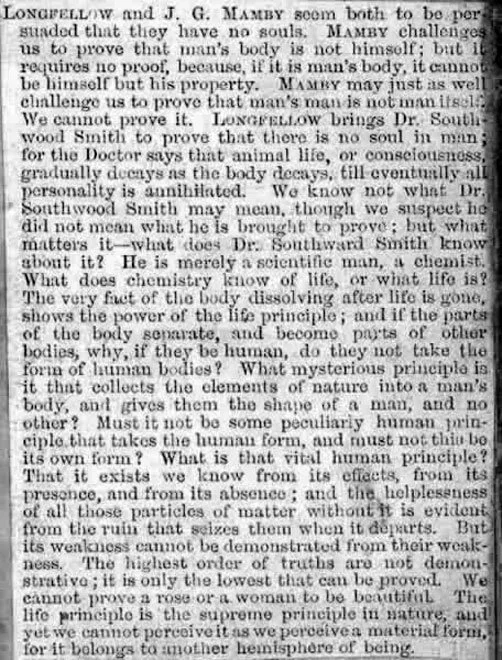LONGFELLOW AND J. G. MAMBY
LONGFELLOW AND J. G. MAMBY seem both to be persuaded that they have no souls. Mamby challenges us to prove that man’s body is not himself; but it requires no proof, because, if it is man’s body, it cannot be himself but his property. Mamby may just as well challenge us to prove that man’s man is not man itself. We cannot prove it. Longfellow brings Dr. Southwood Smith to prove that there is no soul in man; for the Doctor days that animal life, or consciousness, gradually decays as the body decays, till eventually all personality is annihilated. We know not what Dr. Southwood Smith may mean, though we suspect he did not mean what he is brought to prove; but what matters it? He is merely a scientific man, a chemist. What does chemistry know of life, or what life is? The very fact of the body dissolving after life is gone, shows the power of the life principle; and if the parts of the body separate, and become parts of other bodies, why, if they be human, do they not take the form of human bodies? What mysterious principle is it that collects the elements of nature into a man’s body, and gives them the shape of a man, and no other? Must it not be some peculiarly human principle that takes the human form, and must not this be its own form? What is that vital human principle? That it exists we know from its effects, from its presence, and from its absence; and the helplessness of all those particles of matter without it is evident from the ruin that seizes them when it departs. But its weakness cannot be demonstrated from their weakness. The highest order of truths are not demonstrative; it is only the lowest that can be proved. We cannot prove a rose or a woman to be beautiful. The life principle is the supreme principle in nature, and yet we cannot perceive it as we perceive a material form, for it belongs to another hemisphere of being.
Relevant link: Henry Wadsworth Longfellow
